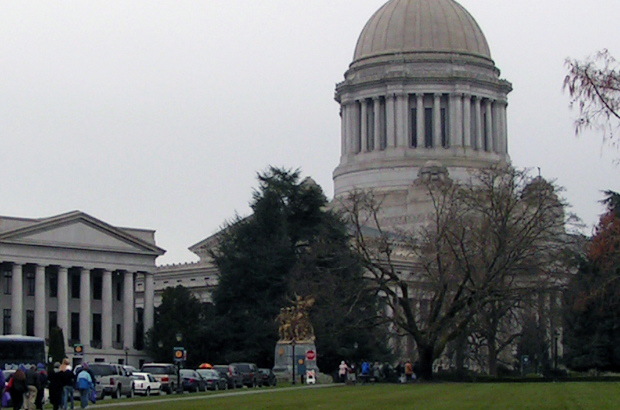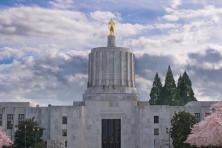It happened fast, but Washington’s short legislative session has come to a close. While much of the excitement was focused on the passing of a massive, first-of-its-kind transportation package (which is big; more on what it means for climate and vehicle electrification below), we can highlight some key climate policies that made it through to the end and note what didn’t pass (particularly efforts to clean up climate and air pollution from buildings) that we especially worked on–noting other groups also had other climate priorities (a great shift to see that expansion as well). Notably the Legislature did take some steps on clean energy manufacturing and projects, methane emissions, and others that were less “flashy” than a historic transportation package, but these were still essential and significant steps forward in the effort to reduce Washington’s climate pollution and impacts.
It’s worth naming the nature of opposition to clean buildings legislation. Sometimes it might seems that bills like this “die” a natural death when, in fact, certain entities are actively blocking policy progress. This year, climate and clean energy efforts once again saw a significant foe in the gas industry. Across the country, efforts to reduce pollution from buildings continue to be met with organized resistance and misinformation from the gas industry including the use of industry front groups (a ye olde tactic from the oil industry playbook). The scope of opposition has also grown beyond building electrification and started to encroach on more previously widely accepted energy efficiency measures such as weatherization, optional energy codes, and more. Opposition misinformation during testimony included raising the specter of cost, claiming a lack of available electric building technology, and arguing that gas has an essential role in powering the future. Despite evidence that reducing methane emissions (the main component in natural gas) is critical to fighting climate change and an increasing risk for public health, the gas industry seeks to delay and block any and all buildings policies and have been working to associate any action on buildings as “anti-gas.”
CLEAN TRANSPORTATION
WHAT LEGISLATURE PASSED:
Investments
Transportation package - SB 5974/HB 2119
The transportation package is a $17 billion package without a gas tax, $5.4 billion of which comes from Climate Commitment Act funds. CCA dollars are invested in historic amounts in transit, bike and pedestrian projects, transportation electrification, and ferry electrification. Additionally, the package ensures that the Clean Fuel Standard, passed in 2020, will be implemented on schedule as originally planned.
Electric Vehicles
Right to charge - HB 1793
The inability to charge at home is still cited as a major barrier to EV adoption, and about one-third of Washingtonians live in communities with homeowner’s associations. This bill ensures that HOAs, condo communities, and similar associations cannot place unreasonable restrictions on the installation of electric vehicle charging equipment. This is really important to ensuring that people in these communities have access to the charging infrastructure they may need.
DID NOT PASS:
Drayage Proviso
We worked hard to get funding for a pilot program that would (1) provide point-of-sale vouchers to owner-operators of port drayage trucks so they would be able to purchase zero emissions trucks and (2) fund overnight charging/parking depots. This would have been a really important project for climate pollution, air pollution, and environmental and economic justice. While many legislators were excited by the prospect of electric drayage trucks, the proviso did not make it into the final operating budget. However, drayage vehicles may be eligible for the $25 million in EV rebates in the supplemental operating budget, depending on how agencies structure a program for distributing this money.
LAND USE
DID NOT PASS
Growth Management Act and Climate - HB 1099
HB 1099 would have required cities and counties that do comprehensive planning to account for climate change, reducing climate pollution, and reducing vehicle miles traveled under the Growth Management Act. It made it almost to the very end, but the House let the clock run out before giving final approval to the conferenced bill.
Missing middle housing - HB 1782/SB 5670
The lack of housing supply in urban areas has created an affordability crisis; it also is bad for the climate as people are forced to live further from essential services, jobs, transit and more. This bill, which was Governor request legislation, would have required cities with a population above 25,000 to allow “missing middle housing” within half a mile of transit stops and duplexes in other residential areas. Unfortunately, this policy did not make it to the floor in either chamber, despite having a broad base of support.
CLEAN BUILDINGS
WHAT THE LEGISLATURE PASSED
Building Performance Standard - SB 5722
This bill includes smaller buildings in the benchmarking and energy management components of the previous Clean Buildings Act passed in 2019. Smaller buildings can also be included in the state’s Building Performance Standard requirements in 2030 if Commerce chooses.
State buildings - HB 1280
This bill requires that when major publicly-owned or state-leased facilities are constructed, a life-cycle cost analysis is conducted, and that the use of all-electric energy systems and at least one renewable energy or combined heat and power system is considered. As the state of Washington continues to move towards clean, electric buildings, it is critical that public buildings at least consider clean options as they move forward with planning.
DID NOT PASS:
Targeted Electrification - HB 1767
Homes and buildings are the fastest growing source of emissions, and this bill would have helped provide financial assistance to customers that choose to transition to electric heat pumps. The bill clarified that public utilities can create electrification programs, allowing them to provide incentives for customers to buy efficient heat pumps. Utilities could only create these programs if they found it was in the best interests of all their customers, not only those receiving the incentives. Utility electrification programs improve customer choice, lower the cost of efficient all-electric technologies, and level the playing field between private and public utilities. This bill passed the House Environment & Energy Committee but did not get a floor vote in the House due to misinformation from the gas industry and building sector.
Energy codes - HB 1770
Local jurisdictions need more tools they can rely on to protect residents and ensure that new homes and residential buildings are clean. This would have directed the Department of Commerce and the State Building Code Council to develop a local option code for residential buildings that local governments can adopt, focused on energy efficiency and clean energy. The bill passed the House 51-47, but failed to pass the Senate due to misinformation from the gas industry and building sector.
OTHER KEY CLIMATE POLICIES PASSED
Clean Energy Siting (EFSEC) - HB 1812
This improves siting laws by providing clarity for project proponents around the state’s expectations, certainty and predictability around review timeline, how environmental justice will be considered in the process, and more. We need to replace our expansive fossil fuel infrastructure—oil refineries, natural gas power plants, and more—with new clean replacements, and this bill helps to facilitate that process.
Landfills and Organics - HB 1799 & HB 1663
Solid waste landfills are a significant source of methane emissions, as well as air pollutants like particulate matter that harm our health. Washington’s state greenhouse gas inventory says that landfills emit 1.5 million metric tons of carbon dioxide equivalent per year, though this is likely an underestimate, and according to an Ecology report, organic waste (yard waste, food waste and other organic material) makes up almost 30% of our landfill and incinerated waste in Washington. HB 1799 sets a statewide target for diversion of organic material from the landfill/incinerator stream and a separate target for edible food diversion to food rescue groups, a key strategy for greenhouse gas reduction and air quality improvements. HB 1663 further directs the Ecology to develop standards for solid waste landfills that have over 450,000 tons of waste and generate more than 2 million BTU of methane per hour. It sets methane emissions standards and requires covered landfills to install a methane capture and control system to control emissions, also a key strategy for reducing methane emissions from our landfills.
DID NOT PASS
Clean Lawn equipment tax incentives - HB 1918 & SB 5543
Fossil fuel-powered lawn equipment is often overlooked as a source of climate pollution, but this equipment emits a significant amount of climate pollution and harmful air pollutants. Running a gas lawnmower for one hour causes as much smog-forming pollution as driving a Toyota Camry 300 miles, and using a gas leaf blower for an hour causes the same amount of this pollution as driving for 1,100 miles. Lawn equipment is routinely used in residential areas, near schools, in parks, and other public spaces, harming Washingtonians and workers in addition to jeopardizing our well-being by feeding the climate crisis. HB 1918 would have helped us transition to clean, electric lawn equipment by providing a sales and use tax exemption, and SB 5543 would have provided a B&O tax exemption for the seller of the equipment if they offered product discounts. Both failed to pass this year.



